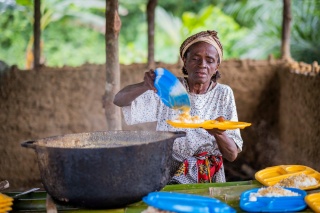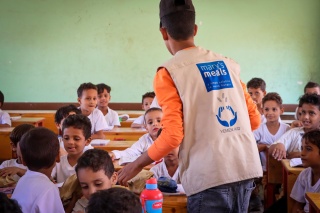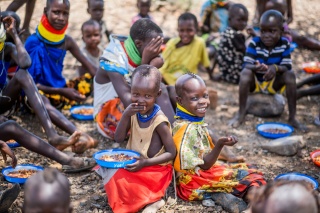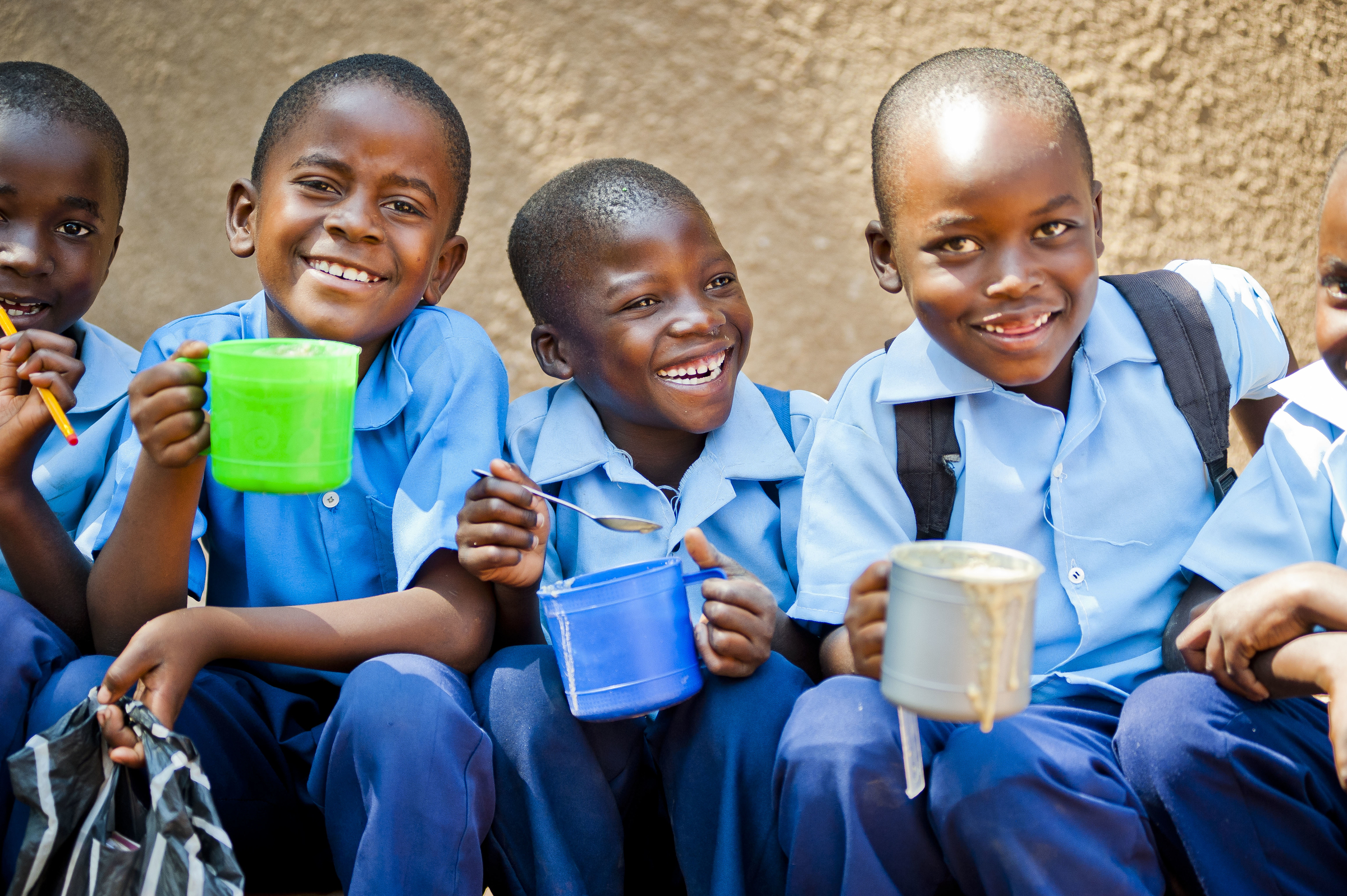
Mary's Meals: How we reach the most vulnerable children
We serve more than 2.4 million children every school day in 18 countries worldwide. Read on below to find out how.
For more than two decades, our school feeding programme has been generating real and measurable change in some of the world’s poorest and most vulnerable communities, supporting a generation of children to build a future beyond poverty.
Our nutritious meals are served to more than 2.4 million children every school day in 18 countries worldwide. No two contexts are the same, but the communities we work with are all carefully selected as places of great need, where factors such as extreme poverty, conflict, and climate-related issues drive up rates of child malnutrition and hinder access to education.
Haiti, Liberia and South Sudan are just a few of the countries where we navigate challenging environments to bring children hope of a brighter tomorrow through the promise of a meal every school day. All too often, the meal children receive from Mary’s Meals at school is the only guaranteed food they will eat in a day, so our approach to school feeding is designed to ensure we can reach children in areas where school meals can make the most difference.
Children are at the heart of everything we do at Mary’s Meals, and our movement – a global family with a fierce determination to succeed – strives to provide daily school meals, promoting access to education for the most vulnerable. At all schools where our meals are served, every child receives the same meal and no-one is left out. This approach encourages inclusion and equality among children in communities; we have witnessed learners from warring factions in South Sudan coming together to eat the same meal and some of the poorest children in India – who may otherwise never have set foot in a place of education – relishing their chance to learn.

Targeting vulnerable communities in a world overrun by hunger and food insecurity
We are guided by need and are committed to supporting children who live in some of the most challenging, unstable and food-insecure contexts in the world. While the idea of serving food in a place of education is simple, bringing much-needed school meals to some of the world’s most vulnerable children is a complex operation. Deciding which communities to work with involves many considerations and actions, so we have a robust process to guide the choices we make.
To pinpoint where our meals will be served, we first identify countries where children experience high levels of poverty, food insecurity and malnutrition, and where there are also low rates of school enrolment. We then assess whether we, as a global school feeding organisation, have the means to deliver school feeding safely and if a reliable supply chain exists to allow us to source the food and consistently deliver the meals efficiently. Governmental and non-governmental feeding programmes already in operation are also considered, and whether our programme would fit in a context where any existing intervention may already be in place.
At a local level, once our meals are being served successfully in a place of education, we channel our efforts into reaching every school in the same area, if the need exists. This approach ensures that children can attend their nearest education centre and are not drawn to a school further away because of the meals (which can skew enrolments and put pressure on teachers and resources in oversubscribed schools).

Co-existing with these meticulously planned operations is our willingness and ability to respond to the unequivocal need that is presented to us. And occasionally, situations arise that are purely fortuitous. During a trip to Malawi some years ago, Mary’s Meals founder Magnus MacFarlane-Barrow was invited by a local youth club to climb a large mountain – called Chaoni Hill – on Pentecost Sunday. After hours of climbing, they reached a village with a church where people of all different cultures and faiths were arriving to celebrate together. Word had gotten around about the arrival of Magnus and, as he was leaving the church, he was greeted by several hundred people on a football field, some of whom had travelled from the neighbouring mountain to attend. Members of the group explained that around 5,000 people were living in the surrounding villages and that more than 900 children attended the only school. As Magnus had seen so often on his travels, poverty and hunger were driving dropout rates; a class of more than 100 children had shrunk to just 13.
Magnus addressed the crowd of people, explaining about the long waiting lists for schools to join the Mary’s Meals feeding programme. He also questioned how it would be possible to transport the food up the mountain for the meals to be served as the nearest road was three miles away. Their immediate response was that they would carry the food from a village at the bottom of the mountain if Mary’s Meals could deliver it there for their children. Before long, the same determined people from the Chaoni community were doing just that; men and women working in partnership with Mary’s Meals, volunteering their time and carrying bags of grain up the mountain to cook and serve their children a vital meal every school day as they learn.
The integral role played by our partners
In countries such as India, Ecuador, Syria, Madagascar, and Yemen, our meals are served to children through our global network of in-country partners. These specialist organisations are attuned to the complexities of geography and political and cultural dynamics in their own locality, and of course understand that hunger is not just a result of poverty, but also a contributing factor to the cycle of poverty. They share their experience, knowledge and relationships and provide access to infrastructure and staff, while working closely with us to ensure the programme is delivered in line with our approach and model. Their commitment helps our programme to flourish and extends the reach of our meals far beyond what would otherwise be possible.
Feedback Madagascar and Money for Madagascar (MfM) serve our school meals to more than 88,000 children in 533 places of education every school day. Feedback Madagascar has been working alongside some of the poorest communities on the island country for more than 30 years are delivers our meals to children in schools across four regions: Amoron’i Mania and Haute Matsiatra in central Madagascar and Vatovavy and Fitovinany in southeast Madagascar.
MfM is a charity that empowers children and families and improves educational outcomes in rural areas. With their support, our meals are reaching schoolchildren in the Itasy region and the capital city, Antananarivo. These children are particularly vulnerable as they face constant threats of extreme weather – cyclones, flooding and severe drought in the south – as well as not having enough food to eat.
Our third partner in Madagascar, Grandir Dignement, operates our programme in a very special context to reach extremely vulnerable children in detention centres (and one reintegration centre). These children can be as young as eight years old, living in terrible conditions as they await trial. Often, they are from very poor backgrounds and are being detained for petty crimes like stealing food. Grandir Dignement has been teaching literacy, numeracy and vocational skills to children in detention for many years, and before our partnership, the work was hindered by a lack of consistent provision of food for the children in the facilities. Together, we are bringing hope to some of Madagascar’s most marginalised children – both in schools and detention centres – fuelling their learning and development in even the most trying environments.
In India, Mary's Meals is nourishing young minds in some of the most unexpected locations. When we think of ‘places of education’, we probably bring purpose-built schools to mind. However, in India, informal education centres exist all over the country, giving orphaned or abandoned lower caste children living in poverty an opportunity to learn and play safely.
In a village in Haryana (a North India state surrounding New Delhi) known as Slum Area Sector 7, hidden among a collection of houses made from plastic and cardboard, children gather under a tarpaulin sheet propped up on a barren patch of wasteland, learning the Hindi alphabet. Their eagerly anticipated meals are cooked by Mary’s Meals volunteers at a nearby orphanage and arrive in metal pots on the main road. The children greet the delivery of the food and return to the tent to eat. In the countryside of Uttar Pradesh, children congregate at a centre operating under a thatched shelter joined to a house to learn and enjoy food from Mary’s Meals. When Mary's Meals CEO and founder, Magnus MacFarlane-Barrow, visited the site a few years ago, he was greeted by a man whose three daughters had attended the centre then moved onto mainstream schools nearby. Every school day, more than 71,000 children across schools and informal education centres in India receive Mary’s Meals through the work of our long-standing local partner, BREAD.
People are key to our success
Behind our steadfast approach to school feeding are tens of thousands of individuals carrying out little acts of love and making our vision – that every child receives one daily meal in their place of education – a reality. Lots of people all over the world are playing their part by doing different things; coming together to make something truly amazing happen. Community ownership is central to how our programme works and how our meals are served.
The first step in bringing our programme to a new place is a conversation between the community, the school, and Mary’s Meals, during which roles and responsibilities of each party are outlined to ensure that roles are clear. This three-way partnership mobilises parents, grandparents, teachers, neighbours and local people to run the day-to-day activity of delivering our meals in schools.

Mary’s Meals is always on hand to provide support, training and monitoring and to organise the provision of the vital ingredients needed to produce the meals, but the serving of meals every school day is possible because of the engagement and long-term commitment of communities that drive our work forward. In more difficult to reach areas, it is the work of our highly skilled partner organisations whose teams work with local communities and volunteers to serve the meals on our behalf.
All over the world, there is a powerful global movement of people behind us. Fundraisers, volunteers and supporters share their money, time, skills and prayer to play their part in our work. The many and varied things they do on our behalf are quite incredible; collecting and raising life-changing funds, planning all sorts of awareness-raising activities and events, and using their own talents and networks to spread the word about our work.
With generous support and dedication from people who share our vision, we will continue to journey together, bringing vital school meals to vulnerable children living in the some of the world’s poorest communities. We can all play a part in building a brighter tomorrow and, in a world where children still go hungry and miss out on school, we must.
Learn more about our global movement and sign up for our newsletter today at the link below.

